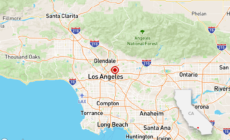-
Prop. 35, which taxes managed care organizations, passed by California voters - 13 mins ago
-
NYT ‘Connections’ November 8: Clues and Answers for Game #516 - 15 mins ago
-
Trump’s Believers See a Presidency With God on Their Side - 34 mins ago
-
Trump-Appointed Judge Kills Biden Immigration Policy Days After Election - 50 mins ago
-
California voters pass Prop. 2, state bond measure to upgrade schools - 54 mins ago
-
Prince William: Past Year Hardest of Life, After Kate and Charles’ Cancer Diagnoses - about 1 hour ago
-
Trump’s Potential AG Asks for Pardon List From Jan. 6 Sympathizer - about 1 hour ago
-
Mountain fire fouls the air, forcing a wood-burning ban - 2 hours ago
-
Inside Jill Duggar’s Life Post Reality TV - 2 hours ago
-
Harris’s Short 2024 Campaign Was Her Undoing — and Biden’s Fault - 2 hours ago
Preliminary Georgia Election Result a Win for Putin, but Rivals Call Foul
Former Soviet nation Georgia’s ruling party claimed victory in a contentious election that hands Russian President Vladimir Putin a major boost, however opposition parties have called foul on the results.
Georgia’s Central Election Commission declared the ruling party Georgian Dream the victor of the closely fought and observed election with a 52.99 percent majority, but some paper ballots and Georgian votes from abroad still need to be counted, according to The Associated Press.
“The Georgian people have cast a vote for the European future of this country, and therefore we will not accept these falsified results published by the Central Election Commission (CEC),” Tina Bokuchava, leader of the United National Movement, told reporters Saturday.
Nika Gvaramia, leader of the Coalition for Change party, called the result a “constitutional coup,” while opposition leaders have refused to recognize the result due to alleged “falsification” of the tallies, Reuters reported.

Giorgi Arjevanidze/AFP via Getty Images
An electoral observer coalition announced that the group would “continue to demand the annulment of the results.”
Many viewed the election as an indicator for the country’s future, determining whether the former Soviet republic continues its trend towards positive Western relations or backtracks to Russia.
Opposition parties have pledged to work together and remove laws that have thus-far prevented a path to European Union citizenship, which would fly in the face of Putin’s long-term goals.
Georgian Dream has also threatened to ban its opponents and styled them as a “global war party” for pro-Ukrainian rhetoric. Georgia itself was invaded by Russia in 2008, and Russian troops remain in two breakaway regions.
The ruling party Georgian Dream, which has held power since 2012, faced a coalition of opposition parties that placed foreign policy at the heart of a bitter fight for votes, with accusations of Russian interference aimed to keep Georgian Dream in power.

Giorgi Arjevanidze/AFP via Getty Images
Exit polls published by each side following the close of voting provided competing and contradictory results that the rival factions used as justification to declare victory, but counting continued well into the night.
Imedi TV, which supports the ruling party, showed Georgian Dream winning with 56 percent of the vote, while two pro-opposition channels showed gains that would indicate a coalition government taking the majority.
Some voters claimed that they had faced threats of intimidation and pressure to vote for Georgian Dream, and the opposition parties accused Georgian Dream of “hybrid war” against its citizens.
Russia has had its hand in the election for months, starting with claims in the summer that the U.S. was planning a “Color Revolution” and pre-emptively accused the U.S. of preparing to interfere with plans to reject the results and pressure to “suppress the vote by force.”
But Russia has faced such accusations in the runup not only to the Georgian election but the Moldovan referendum on joining the European Union, which passed earlier this week by a slim margin of 50.46 percent with 99.6 percent of the vote counted, according to the BBC.
The Moldovan presidential election has gone to a runoff, with Moldovan President Maia Sandu pledging to win a second term while accusing pro-Russian businessman Ilan Shore of mass bribery to affect the outcome.
Source link




















